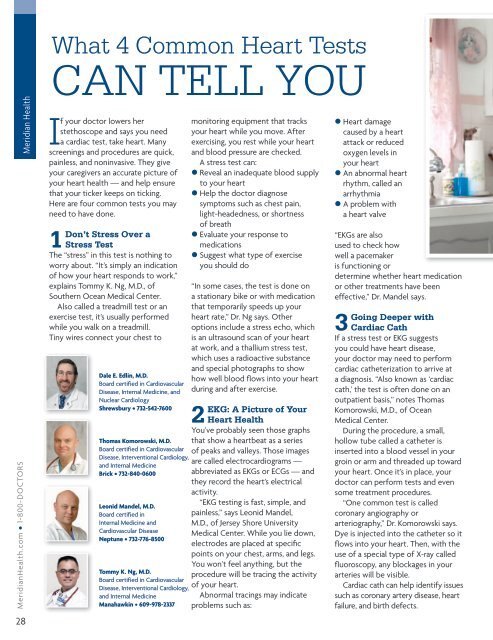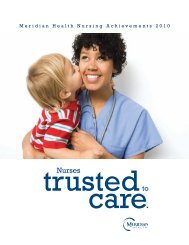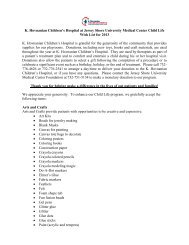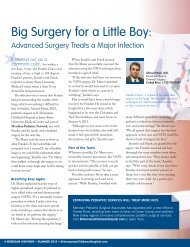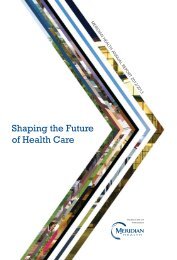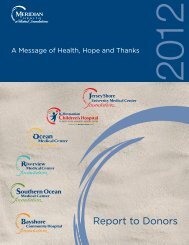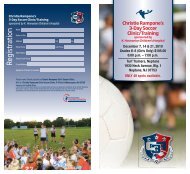Download the January/February Issue - Jersey Shore Medical Center
Download the January/February Issue - Jersey Shore Medical Center
Download the January/February Issue - Jersey Shore Medical Center
You also want an ePaper? Increase the reach of your titles
YUMPU automatically turns print PDFs into web optimized ePapers that Google loves.
What 4 Common Heart Tests<br />
Can Tell You<br />
Meridian Health<br />
MeridianHealth.com • 1-800-DOCTORS<br />
28<br />
If your doctor lowers her<br />
stethoscope and says you need<br />
a cardiac test, take heart. Many<br />
screenings and procedures are quick,<br />
painless, and noninvasive. They give<br />
your caregivers an accurate picture of<br />
your heart health — and help ensure<br />
that your ticker keeps on ticking.<br />
Here are four common tests you may<br />
need to have done.<br />
1<br />
Don’t Stress Over a<br />
Stress Test<br />
The “stress” in this test is nothing to<br />
worry about. “It’s simply an indication<br />
of how your heart responds to work,”<br />
explains Tommy K. Ng, M.D., of<br />
Sou<strong>the</strong>rn Ocean <strong>Medical</strong> <strong>Center</strong>.<br />
Also called a treadmill test or an<br />
exercise test, it’s usually performed<br />
while you walk on a treadmill.<br />
Tiny wires connect your chest to<br />
Dale E. Edlin, M.D.<br />
Board certified in Cardiovascular<br />
Disease, Internal Medicine, and<br />
Nuclear Cardiology<br />
Shrewsbury • 732-542-7600<br />
Thomas Komorowski, M.D.<br />
Board certified in Cardiovascular<br />
Disease, Interventional Cardiology,<br />
and Internal Medicine<br />
Brick • 732-840-0600<br />
Leonid Mandel, M.D.<br />
Board certified in<br />
Internal Medicine and<br />
Cardiovascular Disease<br />
Neptune • 732-776-8500<br />
Tommy K. Ng, M.D.<br />
Board certified in Cardiovascular<br />
Disease, Interventional Cardiology,<br />
and Internal Medicine<br />
Manahawkin • 609-978-2337<br />
monitoring equipment that tracks<br />
your heart while you move. After<br />
exercising, you rest while your heart<br />
and blood pressure are checked.<br />
A stress test can:<br />
• Reveal an inadequate blood supply<br />
to your heart<br />
• Help <strong>the</strong> doctor diagnose<br />
symptoms such as chest pain,<br />
light-headedness, or shortness<br />
of breath<br />
• Evaluate your response to<br />
medications<br />
• Suggest what type of exercise<br />
you should do<br />
“In some cases, <strong>the</strong> test is done on<br />
a stationary bike or with medication<br />
that temporarily speeds up your<br />
heart rate,” Dr. Ng says. O<strong>the</strong>r<br />
options include a stress echo, which<br />
is an ultrasound scan of your heart<br />
at work, and a thallium stress test,<br />
which uses a radioactive substance<br />
and special photographs to show<br />
how well blood flows into your heart<br />
during and after exercise.<br />
2<br />
EKG: A Picture of Your<br />
Heart Health<br />
You’ve probably seen those graphs<br />
that show a heartbeat as a series<br />
of peaks and valleys. Those images<br />
are called electrocardiograms —<br />
abbreviated as EKGs or ECGs — and<br />
<strong>the</strong>y record <strong>the</strong> heart’s electrical<br />
activity.<br />
“EKG testing is fast, simple, and<br />
painless,” says Leonid Mandel,<br />
M.D., of <strong>Jersey</strong> <strong>Shore</strong> University<br />
<strong>Medical</strong> <strong>Center</strong>. While you lie down,<br />
electrodes are placed at specific<br />
points on your chest, arms, and legs.<br />
You won’t feel anything, but <strong>the</strong><br />
procedure will be tracing <strong>the</strong> activity<br />
of your heart.<br />
Abnormal tracings may indicate<br />
problems such as:<br />
• Heart damage<br />
caused by a heart<br />
attack or reduced<br />
oxygen levels in<br />
your heart<br />
• An abnormal heart<br />
rhythm, called an<br />
arrhythmia<br />
• A problem with<br />
a heart valve<br />
“EKGs are also<br />
used to check how<br />
well a pacemaker<br />
is functioning or<br />
determine whe<strong>the</strong>r heart medication<br />
or o<strong>the</strong>r treatments have been<br />
effective,” Dr. Mandel says.<br />
3<br />
Going Deeper with<br />
Cardiac Cath<br />
If a stress test or EKG suggests<br />
you could have heart disease,<br />
your doctor may need to perform<br />
cardiac ca<strong>the</strong>terization to arrive at<br />
a diagnosis. “Also known as ‘cardiac<br />
cath,’ <strong>the</strong> test is often done on an<br />
outpatient basis,” notes Thomas<br />
Komorowski, M.D., of Ocean<br />
<strong>Medical</strong> <strong>Center</strong>.<br />
During <strong>the</strong> procedure, a small,<br />
hollow tube called a ca<strong>the</strong>ter is<br />
inserted into a blood vessel in your<br />
groin or arm and threaded up toward<br />
your heart. Once it’s in place, your<br />
doctor can perform tests and even<br />
some treatment procedures.<br />
“One common test is called<br />
coronary angiography or<br />
arteriography,” Dr. Komorowski says.<br />
Dye is injected into <strong>the</strong> ca<strong>the</strong>ter so it<br />
flows into your heart. Then, with <strong>the</strong><br />
use of a special type of X-ray called<br />
fluoroscopy, any blockages in your<br />
arteries will be visible.<br />
Cardiac cath can help identify issues<br />
such as coronary artery disease, heart<br />
failure, and birth defects.


